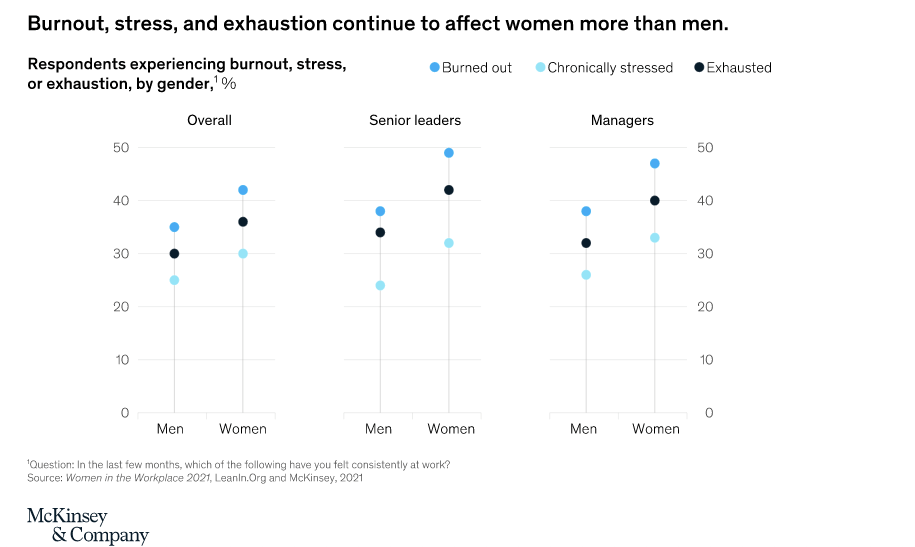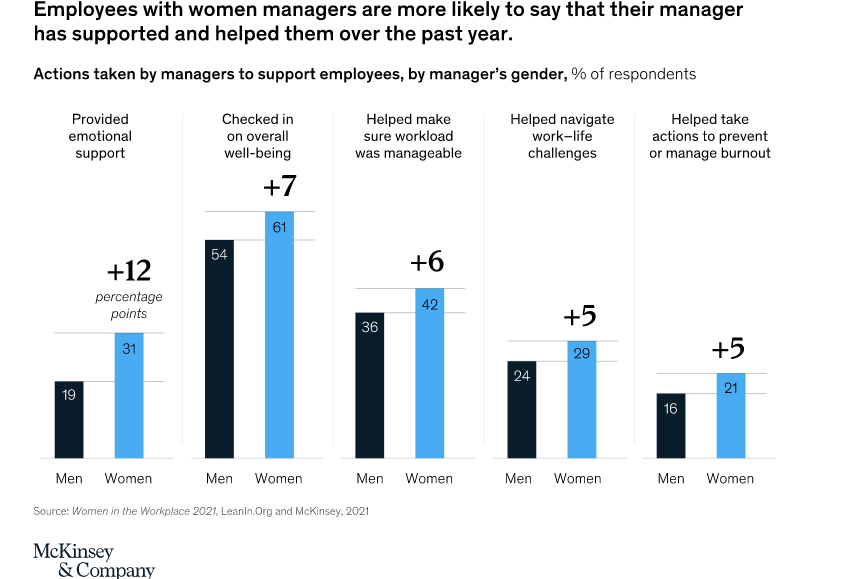Although women in the workforce have made important gains in representation, particularly in senior leadership, in 2020, the toll of the pandemic appears to be hitting women harder than men. As a result, women are experiencing significantly higher rates of burnout compared with their male counterparts. That’s according toWomen in the Workplace 2021, the largest study of women in corporate America, conducted by McKinsey in partnership withLeanln.Org.
Throughout the COVID-19 pandemic to date, the study finds, women leaders have been the major drivers of efforts to support wellbeing and diversity, equity and inclusion efforts in the workforce—increasingly more so than men. Women are also the most likely group to support women of colour at work. These efforts, which add to existing stress and exhaustion, are going largely unrecognised by employers and adding to the rate of burnout for women at work.
This has created a situation of some urgency: Organisations who do not value and prioritise efforts to build inclusiveness, support well-being and navigate the changes imposed by the pandemic risk losing the very leaders they need to succeed.
A pandemic within a pandemic
Without taking proper action and giving it priority, we may be facing a mental health pandemic in the workplace. The stress of the pandemic, the existing “othering” of women, and particularly women of colour in the workplace, and the fact that women, more than men, are doing more work to address mental health and inclusion issues, is leading to a potential burnout crisis for women at work.
Our own Resetting Normal research shows that mental health has emerged as a global and universal challenge. Data show that 72 percent of professionals feel mental health should have an increased focus at work. No matter the age or gender, 32% of respondents reported declining mental health compared to our 2020 report – and women were leading respondents reporting worsening mental health.

The path forward, according to McKinsey research, is that companies must act to address burnout and the underlying issues of mental health and inclusion that increase the likelihood of burnout for women.
Women are rising to the challenges
While organisations and companies continue to adjust and adapt to the new realities and challenges of pandemic-era work, women leaders are rising to the new challenges and putting in the extra hours and work to meet them. This includes actively helping members of their teams to achieve needed work-life balance, ensuring workloads are reasonable and manageable, and paying attention to everyone’s overall wellbeing.

In addition, women leaders are also -- more than men -- doing the diversity, equity and inclusion (DEI) work, which they pick up despite it falling outside of their typical job responsibilities. Examples include supporting employee resource groups and recruiting new talent from underrepresented groups. Finally, women are more likely to commit time to doing the deep cultural work involved in understanding the challenges women of colour face at work
The heavy toll of “othering” behaviour
Organisations and companies cannot ignore the heavy costs to them that result from the negative experiences many women of colour experience in the workplace. Black women, for example, are almost four times as likely as white women to hear people express surprise at their language skills or other abilities, and similar statistics exist for other such microaggressions, as well. Latinas and Asian women are two to three times as likely.
This is a serious concern for businesses. Research shows that people who are confronted regularly with microaggressions in the workplace are twice as likely to experience burnout than those who don’t, more than two times as likely to associate negative feelings to their job and three times as likely to have difficulty concentrating due to stress.
And while there is increasing awareness of the unique challenging facing women of colour in the workplace, there is not as much measurable action being taken to address them. According to the McKinsey report, although more white employees feel they are allies of women of colour at work, they are not any more likely to speak out against discrimination or take other action to support or advocate for women of colour than two years ago. McKinsey’s study also cites an increasing and troubling gap: more than three-quarters of white employees identify as allies to women of colour at work, but fewer than half take any actions to be allies to these colleagues, such as speaking out against bias or advocating for new opportunities for women of colour.
And further, even within the actions white employees do prioritise to support women of colour at work, there is a vast disconnect between these actions taken and those women of colour would actually find most impactful.
Changing business for good
The pandemic has presented the world as a whole, and the world of work in particular, with a multitude of challenges. But within these challenges, there are also opportunities to make positive changes that will sustain beyond the pandemic into the future and improve the workplace for all.
This demands employers and employees to nurture a growing cultural focus on the key issues of employee well-being and racial equity, to ensure the workplace is more inclusive, more understanding and healthier for everyone, which can only be good for business in the long run.



